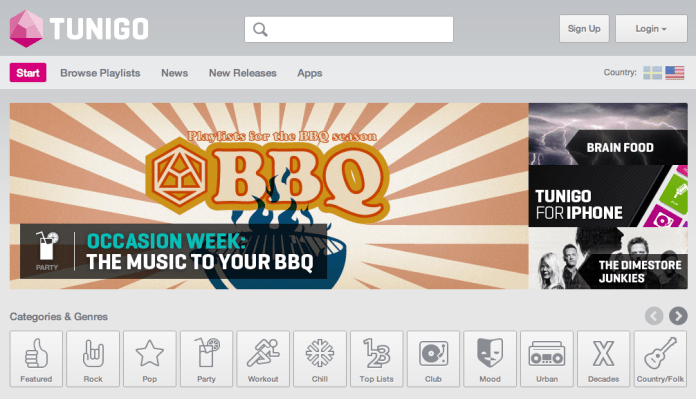Spotify has acquired Tunigo, one of the many music apps that are powered by its API, AllThingsD’s Peter Kafka reported today. The details of the deal aren’t being made public, but the startup will move its staff to either Spotify’s Stockholm or New York offices, as the talent is folded into Spotify’s larger team, Spotify confirmed via email. The Tunigo app will remain available separately for now.
Discovery is the word of the day when it comes to social music apps, with Twitter recently launching its own Twitter Music dedicated mobile and web app after purchasing We Are Hunted. Tunigo’s service is similar, but probably has more in common with apps like Songza and 8tracks, which curate playlists and suggests them to users based on genre, theme and mood. Tunigo is based in Sweden, and has apparently raised around €2.4 million with a staff of 17, also split between Stockholm and New York. The ultimate goal of the company’s mission was to provide a single button that users could hit to get the perfect playlist based on real-time data.
A Spotify spokesperson said that Tunigo has long been an important partner for the company, and points out that Tunigo has been a top ten app since Spotify first launched its app platform back in late November of 2011. “The acquisition fits into our overall strategy around music discovery,” according to the spokesperson, by “basically helping our users make sense of over 20 million tracks.”
In a separate statement from Tunigo CEO and co-founder Nick Holmstén, he explained that the deal made sense for them because they’ve already been working side-by-side with Spotify.
“Tunigo helps users find great music for every moment, and we’ve been working very closely with Spotify over the past few years,” he wrote. “This is the perfect match from a music discovery perspective. We’re passionate about music and technology, and looking forward to further innovating within the music discovery space.”
The first challenge for any company hoping to compete with iTunes on the digital music front is building out a comparably sized library so that users have access to the tracks they want, but once that part is more or less in place, the differentiating factor becomes which service can best help users deal with the crippling problem of overwhelming choice. Music discovery has always been a challenge, long before the rise of digital media and streaming music, but now when your field of selection isn’t just the local record shop, but essentially the whole of history’s recorded music, the problem gets compounded.
In other words, don’t expect this to be the last significant acquisition in this space, as streaming providers and other companies look to build the best discovery engine possible to convince consumers to choose their product over others.
